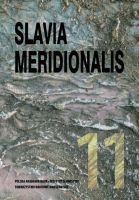Praktyka religijna i tożsamość macedońskich muzułmanów / Torbeszów w kontekście islamizacji na Bałkanach
Religious practice and identity of Macedonian Muslims / Torbeši in the context of islamization in the Balkans
Author(s): Karolina Bielenin-LenczowskaSubject(s): Cultural Essay, Political Essay, Societal Essay
Published by: Instytut Slawistyki Polskiej Akademii Nauk
Keywords: Macedonian Muslims; Islamization of the Balkans; Macedonian culture traditions; Orthodoxy
Summary/Abstract: The subject of this paper is the analysis of identity and religious practices of Macedonian Muslims / Torbeši within the context of Islamisation in the Balkan Peninsula. The Torbeši, i.e. Muslims whose mother tongue is Macedonian, themselves are not unanimous in self-identification. In part they declare their affiliation to the Macedonian nation, in part they consider themselves an autonomous ethnic group, while some derive their origin from the Turks or consider to be Albanians. In Macedonian official discourse Macedonian Muslims are those who convert into Islam during the time of Ottoman Empire. By Christians they are perceived to be our Muslims, i.e. not radical or even not true Muslims. It means, Torbeši are told to be in fact Crypto-Christans who only superficially and officially changed faith, but still practice some Christian activities that are referred in scholarship as Crypto-Christianity, bi-confession or non-completed Islamisation. In Macedonian Muslim or mixed Muslim and Orthodox-Muslim villages these practices are visible – they visit Christian temples, light candles and ask for prayers as well as observe some Christian feasts, like the Day of St. George.
Journal: Slavia Meridionalis
- Issue Year: 2011
- Issue No: 11
- Page Range: 267-280
- Page Count: 14
- Language: Polish

